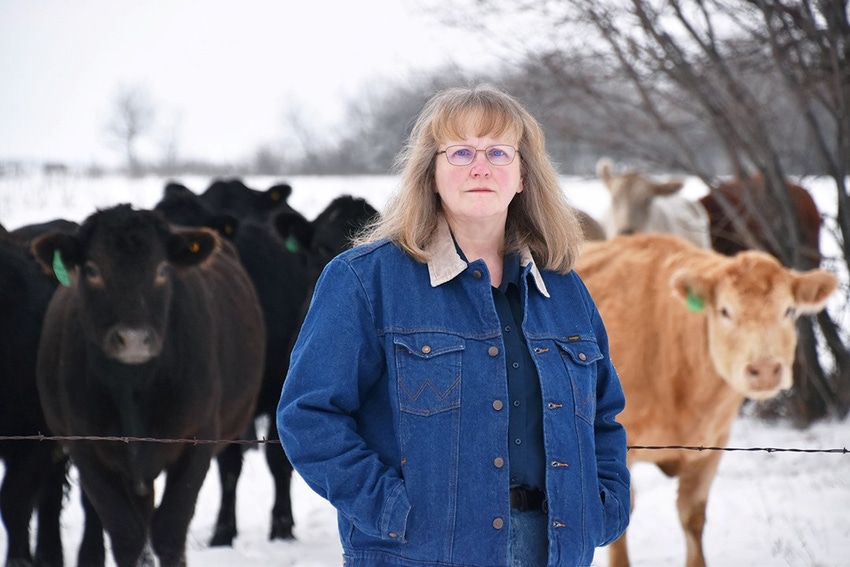USask research chair targets improved cattle health
New $2.35 million research chair targets improved health and productivity in beef herds.
February 4, 2020

With $2.35 million in funding from the Canadian government and the Beef Cattle Research Council (BCRC), University of Saskatchewan (USask) veterinary researcher Dr. Cheryl Waldner will undertake a major five-year research program to advance beef cattle health and productivity.
“This timely and cutting-edge research builds on our university’s strengths in agriculture and One Health to help advance the livestock industry’s economic contributions to the country and ensure continued consumer confidence in the safety and quality of Canadian beef,” USask president Peter Stoicheff said Jan. 30 in announcing the new chair.
The $750,000 award from the federal Natural Sciences & Engineering Research Council (NSERC) is matched by $750,000 in producer checkoff funding from BCRC. USask is contributing $850,000.
As the NSERC/BCRC industrial research chair in One Health and production-limiting diseases, Waldner will work with the industry to address priorities of Canada’s beef producers across the beef value chain — from improved herd health to expanded surveillance of antibiotic use and resistance to increased uptake of best practices for herd management, USask said.
“This chair will use a systems approach to build on existing research and examine complex health challenges,” said Waldner, a professor of large animal clinical sciences in the USask Western College of Veterinary Medicine (WCVM).
“We will identify existing gaps and fill them using innovative data collection and decision-making tools and technologies to enable the Canadian beef industry to better manage production-limiting diseases and develop evidence-based policies for animal health and antimicrobial stewardship," she added.
Management of diseases such as Johne’s disease in cow/calf herds and bovine respiratory disease in feedlots, as well as antibiotic use and antibiotic resistance, are key industry priorities.
“Disease-causing bacteria in animals are increasingly able to resist the antibiotics used to treat them, and the agriculture industry is being challenged to improve antibiotic stewardship in livestock production,” she said.
The tools and technologies to guide herd management and policy and enable targeted precision medicine will include genomics, big data and system science tools, network analysis, computer modeling and smartphone sensors and apps. USask’s computer science researchers will play a key role in adapting these new tools and technologies to industry challenges and providing experts to help researchers manage the volumes of data to support complex decision-making, Waldner said.
“The challenges faced by the beef industry require new and more specialized diagnostic and data management tools that can generate results in real time and trained expertise to help producers make complex animal disease prevention, treatment and management decisions,” BCRC chair Ryan Beierbach said.
USask explained that the award enables the hiring of a junior faculty member, expanding the regional veterinary college’s beef cattle health research capacity. It also includes training for at least three master's students, two doctoral students, one post-doctoral fellow and five undergraduate students, providing skills in great demand by industry and government such as data management and analysis, bioinformatics and systems science.
Among the reasons USask was chosen for the chair — in addition to Waldner’s research record and previous collaborations with BCRC — are the critical mass of beef researchers at WCVM and the USask College of Agriculture & Bioresources, along with having access to the new USask Livestock & Forage Centre of Excellence.
“NSERC is proud to support the University of Saskatchewan, which has a long history of supporting research in the livestock area,” NSERC vice president of research partnerships Marc Fortin said. “Dr. Waldner and her team will develop innovative tools to support policy setting and management decisions in Canada’s beef industry -- a significant contributor to the Canadian economy.”
Furthermore, USask said the new chair builds on a recent $5.6 million Genome Canada award to Waldner and her colleagues at USask and the University of Alberta, including $750,000 announced Jan. 29 by the Saskatchewan Agriculture Development Fund. This project, administered by Genome Prairie, involves developing genomic diagnostics tools that can be used to quickly and accurately identify an antimicrobial treatment for a disease -- something that now takes five to seven days using traditional laboratory tests.
You May Also Like



